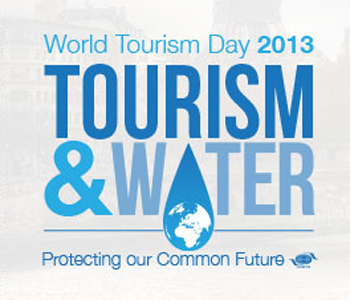
Today (September 27th) is World Tourism Day. To link with the 2013 UN International Year of Water Cooperation, the theme chosen to celebrate the tourism industry this year is Tourism & Water: Protecting our Common Future. The aim is to spotlight the value of water as a resource not just for direct use by tourists (through hotel swimming pools, irrigated gardens and sports fields, and for showers and drinking) but as part of the environment that can attract visitors to an area – in lakes, wetlands and rivers.
Tourism creates high demand for water in often water-scarce destinations, from watering of hotel gardens and golf courses, provision of swimming pools, and higher demand for showers etc from tourists compared with local residents. Wastewater management in areas where tourist numbers greatly increase the local populations during tourism seasons is also an issue. Thus it is important to introduce measures to conserve and recycle water wherever possible. The protection of environments such as wetlands is also vital, and waste management in tourism must ensure that water resources, whether along coasts or freshwater environments, are not polluted as a result of tourist activities.
The official celebrations for World Tourism Day will be in the Maldives today. UN Secretary-General Ban Ki-Moon has issued the following message:
"With unsustainable consumption and climate change threatening global water resources, this year's World Tourism Day highlights the responsibility of the tourism industry to safeguard and intelligently manage water. In this International Year of Water Cooperation, I urge tourism establishments to cut consumption and improve waste management and I call on individuals to play their part by making environmentally conscious choices when they travel. By making water saving a priority we can all help to build the future we want."
World Tourism Organization Secretary-General Taleb Rifai says:
"In 2013, World Tourism Day will be celebrated around the theme Tourism & Water: Protecting our Common Future. This offers a unique opportunity to shine a spotlight on water both as an asset and as a resource and on the actions needed to face up to the water challenge.
Water is one of tourism's main assets. Each year, millions of people travel around the world to enjoy water destinations both inland and in coastal areas. Water is also one of tourism's most precious resources. Water powers all tourism industries, from hotels to restaurants, leisure activities and transport. As one of the largest economic sectors in the world, it is the responsibility of the tourism sector to take a leadership role and ensure companies and destinations invest in adequate water management throughout the value chain. If managed sustainably, tourism can bring benefits to the national and local communities and support water preservation."
For further information, see resources accessible through the World Tourism Day page from the UNWTO. See also the PDF file of the Tourism and Water Background Paper.
CABI's Leisure Tourism Database contains comprehensive coverage of the world literature on tourism, hospitality and related industries. See below for a few relevant references.
References
Tourism and water use: supply, demand, and security. An international review. Gössling, S.; Peeters, P.; Hall, C. M.; Ceron, J. P.; Dubois, G.; Lehmann, L. V.; Scott, D.; Tourism Management, 2012, 33, 1, pp 1-15, many ref. [DOI: 10.1016/j.tourman.2011.03.015]
Water conflicts among different user groups in South Bali, Indonesia. Strauss, S.; Jha, N.; Schoenfelder, J. W.; Human Ecology, 2011, 39, 1, pp 69-79, 35 ref. [DOI 10.1007/s10745-011-9381-3]
Hotel water consumption at a seasonal mass tourist destination. The case of the island of Mallorca. Tortella, B. D.; Tirado, D.; Journal of Environmental Management, 2011, 92, 10, pp 2568-2579, many ref. [DOI 10.1016/j.jenvman.2011.05.024]
Beyond megaprojects?. Water alternatives for mass tourism in coastal Mediterranean Spain. Rico-Amoros, A. M.; Sauri, D.; Olcina-Cantos, J.; Vera-Rebollo, J. F.; Water Resources Management, 2013, 27, 2, pp 553-565, 41 ref. [DOI 10.1007/s11269-012-0201-3]
Estimating the direct and indirect water use of tourism in the eastern Mediterranean. Hadjikakou, M.; Chenoweth, J.; Miller, G.; Journal of Environmental Management, 2013, 114, pp 548-556, many ref [DOI 10.1016/j.jenvman.2012.11.002]
